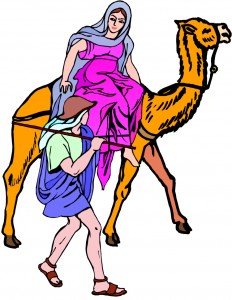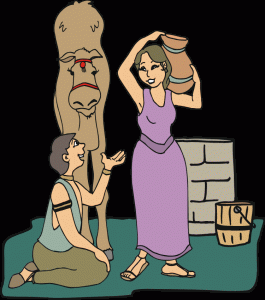The story of Isaac and Rebekah coming together in marriage is amazingly prophetic of Yeshua and his end-times spiritual bride — the saints of redeemed Israel. Here is the story as it unfolds in the pages of your Bible and recorded hundreds of years before the birth of Yeshua the Messiah!
Genesis 24:54, Elizar wanted to leave Babylon immediately with Rebekah and return to Abraham. This is prophetic of YHVH’s plea to his end-time people to come out of Babylon the Great (Rev 18:4) — a last days religious, economic and political system that represents all that is evil and contrary to the Word, will and ways of YHVH-Elohim and Yeshua his Son.

Genesis 24:55, Although Elizar and Rebekah wanted to leave her father’s house in Babylon, her family was not willing to let go of her, but insisted that she remain with them in Babylon. In the end times, some believers will heed YHVH’s call to come out of Babylon the Great, while others will be reluctant to leave succumbing rather to the alurements of Babylon to stay “in her” (see Rev 18:3 cp. 2 Thess 2:1–12 with emphasis on verse 10–12).
Genesis 24:58, Rebekah was a woman of faith and was willing to immediately leave her home in Babylon to marry Isaac in Canaan, whom she had never seen. Those saints who wish to be the bride of Yeshua must be willing to leave the spiritual defilement of modern Babylon and to follow the Lamb wherever he goes, even though they have never literally seen him (Rev 14:4).
Genesis 24:62, The very next time we see Isaac after the Akeidah is in verse 62 where he is meditating, supplicating and praying at the well of Lachairoi, which means, “well of the living one seeing me.” This is a prophetic picture of Yeshua the Son, in heaven awaiting his return to earth after his resurrection. There in the Presence of his Father, the Living One who sees him, and whose throne is the well or source of the river of life, Yeshua is making intercession for the saints who are his bride to be (Rom 8:34; Heb 7:25).
Genesis 24:64, Rebekah arrives from Babylon on a camel — a semi-kosher animal, which chews its cud, but does not have a completely split hoof (Deut 14:7). This animal is emblematic of Babylon — a word that means “mixture” of good and evil. This alludes to the fact that the bride of Yeshua who comes out of spiritual Babylon (Rev 18:4), like the animal Rebekah was riding, will not be a perfectly “kosher” or righteous or a Torah-obedient bride, but will be a mixture of good and evil. This also points to the grace of Elohim who loves us and accepts us as his Son’s bride, even though we are still worldly and carnal.
Now let’s look at this spiritual picture from a slightly different angle. Elizar is a prophetic picture of the Spirit of Elohim finding and preparing a bride for Isaac (a picture of Yeshua). Rebekah answers the call of the Spirit, leaves Babylon, and with her come the ten camels picturing the ten tribes of Israel, which she is responsible for feeding and bringing out of Babylon. It is our role as redeemed Torah-obedient Israelites who have faith in Yeshua to share the truth of the Torah with as many of our Christian brethren as possible who are still caught up in many non-biblical and even pagan religious traditions. As we give them water (i.e., the Word of Elohim) from the wells of salvation (i.e, Yeshua who is both the Written Torah and the Living Torah, i.e, the Word of Elohim that was made flesh, see John 1:1, 14), they will want to come out of spiritual Babylon (Rev 18:4) and return to the Promised Land of the Hebraic roots of their faith. This fulfills Malachi’s end-times prophecy about the hearts of the children being turned back to their fathers (Mal 3:6).
Genesis 24:65,When Rebekah arrives in the Promised Land, Isaac comes out to meet her, his bride, who had just come from Babylon. This is a prophetic picture of Yeshua coming from heaven to meet his spiritual bride in the air at the resurrection of the saints (1 Cor 15:51–53; 2 Thess 4:13–18; Rev 11:14–18). Meanwhile, Rebekah covered herself with a veil. This prophetically points to the saints of Yeshua who receive their glorified bodies at the resurrection at his second coming. It also is a picture of the New Jerusalem descending upon the bride of Yeshua like a glorious spiritual bridal gown when (or after) Yeshua returns (Rev 21:2).
Genesis 24:67, Upon meeting, Isaac immediately takes Rebekah to his tent to consummate the marriage. This prophetically speaks of the marriage supper of the Lamb where Yeshua and his bride become one, which occurs during the Millennium (Rev 19:7–9).




